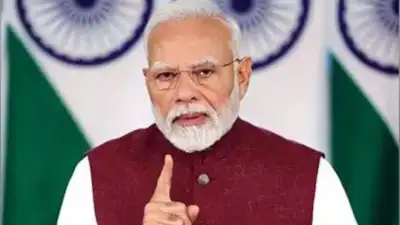In a moment charged with national emotion and strategic gravity, Prime Minister Narendra Modi addressed the nation on May 12, 2025, in the wake of the devastating Pahalgam terror massacre and the swift, decisive military retaliation christened Operation Sindoor.
What may have initially appeared as a conventional post-conflict address turned into a deeply consequential declaration that is likely to reshape not just the contours of India’s counter-terrorism policy, but also the entire grammar of its engagement with Pakistan.
Beneath the calm cadence of his speech lay an unmistakable assertion of doctrine—crisp, unwavering, and unapologetically stern: terror and talks cannot go together. In articulating this yet again, Modi did not merely repeat a slogan from earlier tenures; he crystallized it into a strategic worldview, lifting it from rhetorical reaffirmation into the realm of institutional policy.
Operation Sindoor was not merely a military maneuver. It was India’s visible, audible, and effective message to adversaries near and far—that the rules of engagement had been altered, that sovereignty can no longer be challenged without consequence, and that the days of sterile condemnations and empty summits are over.
The operation surgically dismantled multiple terrorist launchpads across Pakistan and Pakistan-Occupied Kashmir, achieving what the government described as a precise and punitive action against the perpetrators of the Pahalgam massacre. The retaliatory strike bore all the hallmarks of calculated restraint backed by military excellence.
But the speech that followed was not a victory chant. It was the unveiling of a newer, bolder geopolitical thesis—one where diplomacy would no longer be divorced from national dignity, where negotiation would not be a balm applied over bleeding wounds inflicted by proxy warfare.
In the past, successive Indian governments have walked a tightrope between retaliation and reconciliation. History is replete with instances where even in the wake of bloodshed, diplomatic backchannels were quietly opened. The older paradigm thrived on the belief that dialogue must persist, even if violence continues.
But Modi’s address cast a long and final shadow over that obsolete framework. His words carved out a newer order where the precondition for dialogue is not goodwill, but accountability; not shared culture, but shared security. The mention of Pakistan was deliberate, sparing not its people but its institutions that shelter terrorism.
By distinguishing between the populace and the perpetrators, the Prime Minister created a moral distance while retaining a strategic rigidity. In this address, the enemy was not named in ethnic or national terms, but in terms of ideology and action. Terrorism was the pivot, the predicate, and the prism through which all future bilateral interaction would be judged.
There was also the stark invocation of Pakistan-Occupied Kashmir, which Modi asserted would remain the only other item on any future table of talks, should Pakistan wish to engage. That singular statement altered the semantic field of Indo-Pak dialogue from one of parity to one of restitution. It removed the pretense of mutual misunderstanding and replaced it with a framework where one side bears the moral and legal weight of transgression.
By positioning PoK alongside terrorism as the only permissible subjects of dialogue, Modi reframed the regional narrative from defensive retaliation to rightful reclamation. It signaled not just a reaction to present wounds, but a gaze that looked further, beyond the horizon of this moment, into questions of historical injustice and territorial integrity.
The Prime Minister’s rejection of any other bilateral engagement until Pakistan dismantles its terror infrastructure makes it abundantly clear that cricket diplomacy, cultural exchanges, economic dialogues, and people-to-people contact will remain frozen under a thick sheet of strategic frost.
This is not the death of diplomacy; it is the birth of conditional diplomacy—a statecraft that demands merit for engagement and proof for peace. No longer would India entertain euphemisms like strategic restraint or composite dialogue unless those across the table have proven themselves worthy interlocutors through demonstrable action against the machinery of terror.
Interestingly, the speech came shortly after a ceasefire understanding was reached, reportedly initiated by Pakistan through its military channel. But Modi’s articulation of this truce was stripped of any celebratory tone. Instead, it was couched in the language of strength—India accepted the ceasefire not under compulsion but from a position of dominance.
It was restraint shown not from fear but from strategic wisdom. The message was clear: a pause in firing across borders is not the same as a thaw in relations. The ceasefire is a comma, not a period. Its endurance is conditional, and its violation will not go unanswered.
There was also a domestic undercurrent to the speech, subtle yet potent. Modi, while addressing matters of state and security, spoke to the emotional core of a wounded nation. Dedicating Operation Sindoor to the innocent lives lost in Pahalgam—especially the women and children—he tapped into a collective consciousness, galvanizing the national psyche.
The invocation of sacrifice, of moral resolve, and of national unity against terrorism turned the military operation into a moral campaign. It was not merely an act of defense; it was an act of national purification. The language, though firm, carried a pulse of grief and grit—offering solace even as it demanded vigilance.
The international implications of this doctrine are far-reaching. In a world increasingly impatient with terrorism, India’s stance is likely to find sympathy, if not open support. Nations that earlier urged caution and dialogue may now face a firmer Indian narrative that does not plead for understanding but declares its position with clarity and consequence.
Modi’s reassertion effectively flips the burden of proof—no longer must India justify its retaliation; it is Pakistan that must now explain its inaction against terror. The diplomatic theatre has shifted, and so too has the audience’s perspective.
As the dust of Operation Sindoor settles and the world digests Modi’s words, one thing is becoming clear—the India-Pakistan relationship has entered a new era of conditional cold peace. Not a hostile standoff, but not a warm embrace either.
A watchful stillness hovers over the subcontinent, charged with the knowledge that beneath the silence lies a doctrine carved in resolve. The door to diplomacy is not shut, but it is heavily guarded. And only those bearing the credentials of sincerity and the currency of accountability may hope to pass through.
In the long arc of history, this moment may well be remembered as one where India redefined the terms of its engagement with an intransigent neighbor. When Prime Minister Modi repeated the phrase “terror and talks cannot go together,” he was not echoing an old line—he was drawing a red line. And in that act, he may have altered the future geography of peace and conflict in the region.
(Author is RK Columnist and can be reached at: [email protected])








